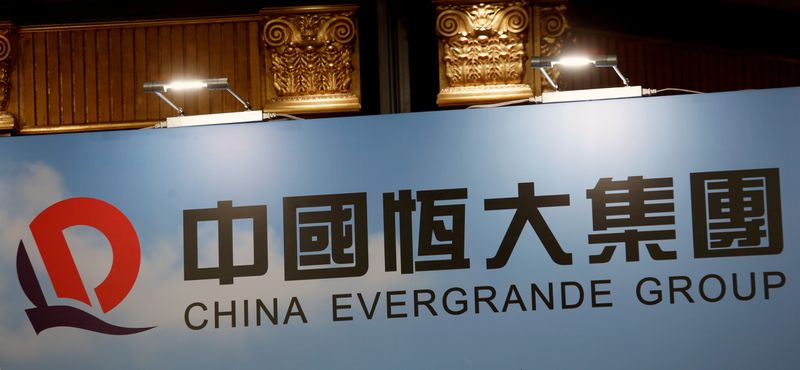SHANGHAI (Reuters) -Shares and bonds of China Evergrande, the country's most indebted developer, stayed in the red on Tuesday as worries over its financial health persisted even after a local housing authority removed an earlier sales suspension at two real estate projects.
Evergrande's Hong Kong-listed shares tumbled as much as 19% to a fresh four-year low in morning trading, following Monday's 16% plunge, after the housing authority in Shaoyang city in south central Hunan province ordered a sales halt for the two residential projects.
The authority had ordered the suspension on suspicion over a misappropriation of funds, according to separate notices dated July 14. But in a reversal on Tuesday, it said the issue had been resolved and the two developments could resume sales.
Evergrande declined to comment when contacted by Reuters.
As of 0650 GMT, Evergrande shares were down 9.1%, while its property management unit Evergrande Services rebounded to trade 2.2% firmer.
The sales halt had deepened worries that Evergrande, which owes roughly $90 billion by June, will struggle to pay its debts. News also emerged on Monday that a Chinese court had frozen one of Evergrande's bank accounts at the request of creditor China Guangfa Bank Co.
"Evergrande's external financing is restricted, so its debt repayment relies heavily on property sales," Everbright Securities analyst Zhang Xu wrote in a report on Tuesday.
But revenue generation is challenging for Evergrande, whose real estate projects for sale are mostly located in China's third- and fourth-tier cities, Zhang added.
Pessimism is spilling into the broader property sector, as China kept its benchmark lending rate unchanged at its July fixing on Tuesday, dashing hopes for a cut after a surprise lowering of bank reserve requirements last week.
China's CSI300 real estate index was down 0.1% on Tuesday afternoon, following Monday's 1.9% slump.
Although China has eased monetary policy slightly to help smaller companies and avert systemic risks, there will be sustained curbs on liquidity flowing into the property sector, said Cheng Hao, Shanghai-based fund manager at Fidelity International.
VICIOUS CYCLE
Wonnie Chu, managing director at GaoTeng Global Asset Management, said that surging bond yields for a developer risked creating a "vicious cycle" that could damage refinancing capabilities.
A Shanghai-traded Evergrande bond closed 6% lower on Tuesday at 64.7 yuan versus its face value of 100 yuan, after recouping some losses. An Evergrande bond maturing in January 2023 ended down 5% in Shenzhen, at 74.9 yuan. Bond prices move inversely to yields.
Chinese developers are struggling with slower sales and rising financing costs as Beijing restricts property loans and imposes policies under the "three red lines" guidance to force deleveraging in the sector.
"The housing situation in China is quite political because it becomes an affordability issue and a matter of social cohesion," said Carlos Casanova, senior economist for Asia at Union Bancaire Privee.
The government will continue to keep curbs in place, "so we are going to see more defaults".

Last week, Chinese real estate developer Sichuan Languang Development said it had overdue debts totalling 4.54 billion yuan.
China Fortune Land Development Co, which defaulted earlier this year, said on Tuesday that its overdue debts had increased to 73.2 billion yuan.